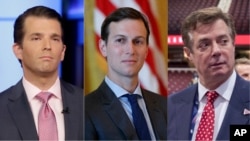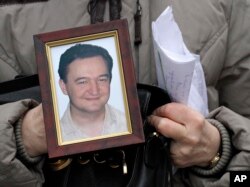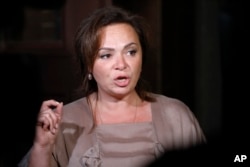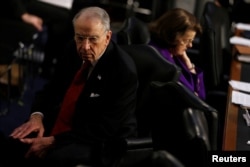Hermitage Capital CEO Bill Browder, who fought successfully to have the Magnitsky Act signed into U.S. law, says he believes the July 2016 meeting between President Donald Trump's eldest son and a Russian attorney who promised incriminating material about Trump's opponent, Democrat Hillary Clinton, was actually part of a long-running Kremlin-backed campaign to subvert the 2012 law targeting Russian human rights abusers.
The 2016 meeting at Trump Tower, the American-born, London-based investor told VOA, coincided with a marathon campaign by Kremlin-linked operatives aggressively seeking repeal of the Magnitsky Act.
Named after Browder's lawyer, Sergei Magnitsky, who died amid allegations of beatings and medical neglect in a Russian jail after working to expose a purported tax fraud scheme by Russian officials, the 2012 law authorizes sanctions against human rights abusers in Russia and bans their entry to the United States.
The Russian government has long denied the fraud charges, and an official Russian probe into Magnitsky's death blamed a heart attack.
“Let's start by saying that [Russian President Vladimir] Putin doesn't like the Magnitsky Act ... because Putin was one of the beneficiaries of the $230 million [tax fraud] that Sergey Magnitsky exposed and was killed over. He has made his single largest foreign policy priority to repeal the Magnitsky Act,” Browder, whose firm was once the largest foreign portfolio investor in Russia, told VOA.
So long as the act remains law, he said, any possible Putin-linked offshore holdings remain vulnerable to a sanctions freeze.
“The second reason why [Putin] hates the Magnitsky Act is that he asks people around him to commit very grave crimes on his behalf ... in order take over people's properties and so on in Russia,” he said. “In order to get people to do these terrible acts, he has to guarantee these people impunity. He could do that in the past. But now, because of the Magnitsky Act, there are consequences outside of Russia that he has no control over. This [lack of guaranteed impunity] challenges the entire operation of his regime.”
The Kremlin typically declines to respond to these allegations, but in 2013 a Moscow court tried and sentenced Browder in absentia on tax evasions charges, accusing him of failing to pay $16 million in taxes. Magnitsky himself was posthumously convicted in that same ruling.
In 2016, Browder said, a group led by Kremlin-linked attorney Natalia Veselnitskaya “went around and tried every different document, every different door to find sympathetic ear to repeal the Magnitsky Act.”
“The meeting with Trump Jr. was just one of the meetings they had. They had meetings all up and down Capitol Hill with members of Congress trying to do the same thing,” he said. “In my opinion it was a completely failed operation, but it does not mean they didn't have a lot of resources to try to make it happen.”
Donald Trump Jr. discussed the Trump Tower meeting with Veselnitskaya, which included the president's son-in-law and White House adviser Jared Kushner, then-campaign manager Paul Manafort, one former Russian intelligence official and at least four others, with Fox News's Sean Hannity last week. In that interview, the 39-year-old Trump described being disappointed when Veselnitskaya changed the subject of the meeting from Hillary Clinton to Russian adoption policy.
“That's when we shut it down,” Trump Jr. said, wondering “… what does this have to do with what we were talking about?”
Russia's ban on adoptions by American families, colloquially referred to as Moscow's “anti-Magnitsky Act,” was advanced by Putin's United Russia party nine days after former President Barack Obama signed the Magnitsky Act into law.
President Trump has defended his 39-year-old son's actions, calling the meeting with Kremlin operatives a normal part of campaign trail “opposition research.”
In excerpts of an interview with Kremlin-funded RT news, Veselnitskaya defended the meeting at Trump Tower. She also contended she was the victim of a “disinformation" campaign organized by Browder, and that “If the Senate wishes to hear the real story, I will be happy to speak up and share everything I wanted to tell Mr. Trump.”
The entire scope of the 2016 meeting, Browder says, may never be ascertained.
“We don't really know,” he said, accusing Veselnitskaya of routinely lying in numerous public statements. “And because the Trump team has constantly changed their story, we can't really believe what they're saying, so we really don't know what happened in those meetings.”
Postponed FARA hearing
Browder was in Washington to testify at a Senate Judiciary Committee hearing scheduled for Wednesday that was to examine Russian lobbying activities and compliance practices under the Foreign Agents Registration Act (FARA). The hearing, in which individuals Veselnitskaya brought to Trump Tower for the July meeting might have been discussed, was postponed late Tuesday.
“None of the lobbyists [who participated in the Russian-sponsored campaign to repeal the Magnitsky Act] were registered as foreigners,” Browder said. “That was the original topic of the hearing that was scheduled several months ago by Senator [Charles] Grassley, because he was concerned about enforcement of the law.
“Since then there has been a spectacular political scandal connected to meetings of Natalia Veselnitskaya and Rinat Akhmetshin at Trump Tower with Donald Trump, Jr. Those issues have created a whole new set of witnesses who could show up to discuss foreigners lobbying in America. And I think that senators decided that they wanted to invite more people and address these broader issues.”
On Thursday, the Senate Committee on the Judiciary announced that it has rescheduled the FARA hearing and combined it with a hearing on attempts to influence U.S. elections.
Asked his opinion of FARA compliance, Browder said the Trump Tower was meeting emblematic of the law's shortcomings.
“At the moment, there's no consequence for somebody not disclosing that they're working as a foreign agent. That has to change,” he said. “The anti-Magnitsky campaign that took place last summer is a stark example of how this type of stuff works. This particular story will probably end up with some strengthening amendments to the law.”







